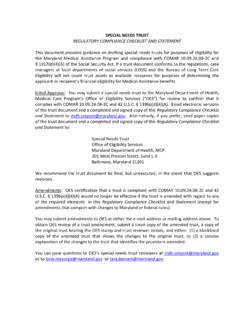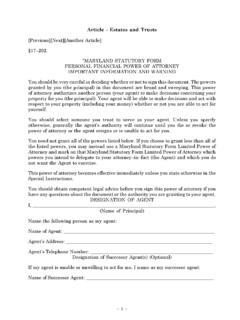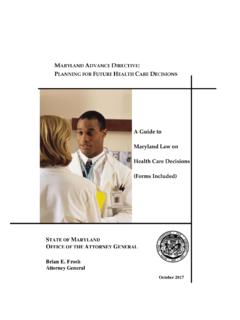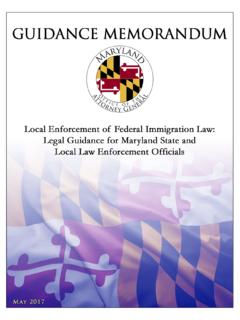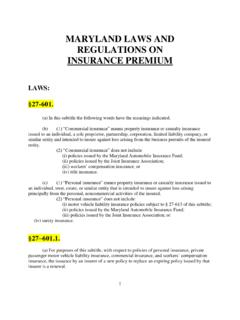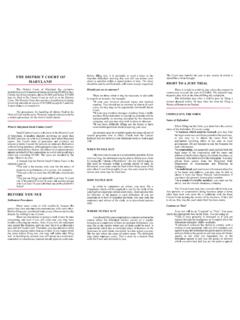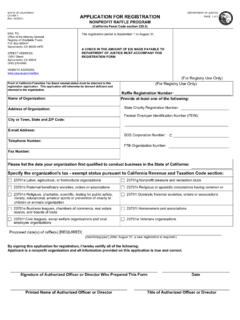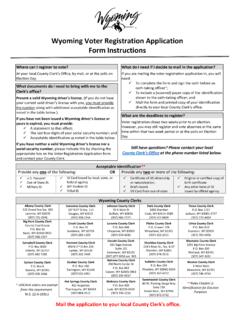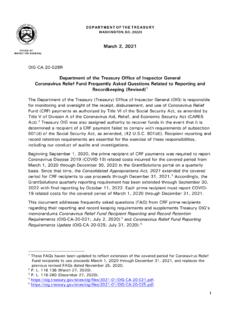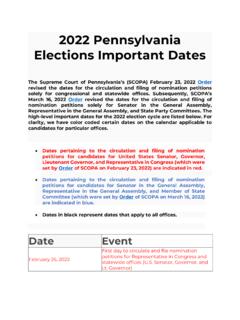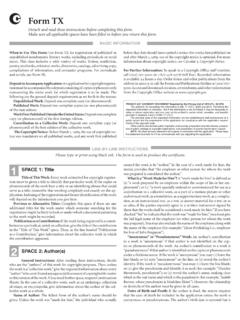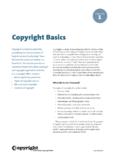Transcription of GUIDE TO LEGAL ASPECTS OF DOING BUSINESS IN MARYLAND
1 GUIDE TO LEGAL ASPECTS OF DOING BUSINESS IN MARYLAND A Joint Publication of the office of the Attorney general and the Department of Commerce Brian E. Frosh Attorney general Larry Hogan Mike Gill Governor Secretary of Commerce Acknowledgments Laila K. Atallah, Principal Counsel, office of the Attorney general , Department of Commerce John Tennis, Director of Antitrust Division, office of the Attorney general Jennifer Wazenski, Principal Counsel, office of the Attorney general , Department of Natural Resources William Gruhn, Principal Counsel, Consumer Protection Division, office of the Attorney general Andrea Baker, Principal Counsel, office of the Attorney general , Department of the Environment Colleen A.
2 Lamont, Assistant Attorney general , Department of Commerce Melanie Senter Lubin, Commissioner, Securities Division, office of the Attorney general Dale E. Cantone, Deputy Commissioner, Securities Division, office of the Attorney general Jeffrey G. Comen, Principal Counsel, office of the Attorney general , Department of Assessments and Taxation Craig A. Nielsen, Principal Counsel, office of the Attorney general , Department of Agriculture Brian L. Oliner, Principal Counsel, office of the Attorney general , Comptroller of the Treasury W. David Rawle, Assistant Attorney general , Department of Commerce Ira Schwartz, Principal Counsel, office of the Attorney general , MARYLAND Technology Development Corporation Karen Glenn Hood, Director of Communications, Department of Commerce Milena Trust, Principal Counsel, office of the Attorney general , Department of Labor, Licensing and Regulation Zenobia Carter, Paralegal, office of the Attorney general , Department of Commerce DISCLAIMER This booklet is for informational purposes only and does not constitute LEGAL services or representation.
3 Further, this booklet is not an exhaustive treatment of the LEGAL obligations of MARYLAND businesses, but rather focuses on only those matters regulated by State agencies. For specific and complete LEGAL advice, please consult with a practicing attorney who is knowledgeable about MARYLAND law and is familiar with the relevant details of your situation. Despite every effort to ensure the accuracy of this booklet s contents, some errors may appear. Moreover, laws can change quite rapidly, and court interpretations of laws often vary. Therefore, no guarantee can be given as to the accuracy and completeness of any information provided in this booklet. The Attorney general s office and the Department of Commerce hereby specifically disclaim any liability for loss incurred as a consequence of any material presented in this booklet.
4 I TABLE OF CONTENTS I. BUSINESS ORGANIZATION A. Introduction .. 1 B. Corporation .. 2 C. general Partnership .. 4 D. Limited Liability Partnership .. 5 E. Limited Partnership .. 6 F. Limited Liability Limited Partnership .. 8 G. Limited Liability Company .. 9 II. FOREIGN BUSINESS OPERATIONS IN MARYLAND A. Introduction .. 10 B. Independent Operations .. 10 C. Joint Venture .. 14 III. MERGERS AND CONVERSIONS UNDER MARYLAND LAW .. 15 IV. SECURITIES LAW A. Introduction .. 17 B. Registration of Securities .. 17 C. Exemptions from Registration Requirement .. 19 D. Preemptions from Registration Requirement .. 19 V. MARYLAND TAXATION A. Introduction .. 20 B. Tax Registration .. 20 C.
5 MARYLAND Sales and Use Tax .. 21 D. MARYLAND Corporation Income Tax .. 22 E. MARYLAND and Local Personal Income Tax .. 24 F. MARYLAND and Local Real Property Tax .. 24 G. Local Personal Property 25 VI. LABOR AND EMPLOYMENT LAW A. Introduction .. 27 B. Employment Eligibility .. 27 C. Equal Employment Opportunity .. 28 D. Safety and Health Standards .. 29 ii E. Workers Compensation Insurance .. 30 F. Wage Laws .. 31 G. Employment-Related Tax Considerations .. 33 H. Employee Concerted Activity .. 35 I. Fringe Benefits .. 35 J. Workforce Services .. 36 VII. BUSINESS ASSISTANCE AND FINANCING PROGRAMS A. Introduction .. 37 B. BUSINESS License Information System .. 37 C. Domestic BUSINESS Assistance Programs.
6 38 D. Domestic BUSINESS Financing Programs .. 39 E. International BUSINESS Assistance and Financing Programs .. 52 F. Employee Training Programs .. 57 G. Tax Credit Incentive Programs .. 57 VIII. ASSISTANCE TO AGRICULTURE BUSINESSES A. MARYLAND Agriculture .. 59 B. Selling MARYLAND Agriculture .. 60 C. Protecting MARYLAND Agriculture .. 61 IX. NATURAL RESOURCES LAW A. Shoreline Development .. 62 B. Forest Development .. 63 C. Licenses .. 63 X. ENVIRONMENTAL LAW A. Introduction .. 66 B. Air and Radiation Administration .. 67 C. Land and Materials Administration .. 68 D. Water and Science Administration .. 70 XI. CONSUMER PROTECTION LAW A. Consumer Protection Act .. 73 B. Uniform Commercial Code.
7 73 C. Services of the Consumer Protection Division .. 73 iii XII. FRANCHISE LAW A. Introduction .. 75 B. Registration and 76 XIII. BUSINESS OPPORTUNITY LAW A. Introduction .. 77 B. Registration and 78 XIV. ANTITRUST LAW A. Introduction .. 78 B. Enforcement .. 79 C. Concepts of Antitrust Law .. 80 D. Prohibited Activities .. 81 E. Trade Associations .. 85 F. Conclusion .. 85 G. BUSINESS Review Procedure .. 85 1 I. BUSINESS ORGANIZATION A. INTRODUCTION State law governs the formation of businesses in the United States; there is no federal law regulating general BUSINESS forms. Normally, a BUSINESS will organize under the law of the state in which its main office or facility is located.
8 This is not a requirement, however; a BUSINESS may choose to organize under any state law, and then comply with the laws for foreign corporations or other foreign entities in those states in which its operations are actually located (See Section II below, Foreign BUSINESS Operations in MARYLAND ). MARYLAND s BUSINESS laws are flexible and serve well those businesses that have chosen to establish operations in MARYLAND . To encourage the creation and expansion of businesses, MARYLAND offers several flexible options for organizing BUSINESS activity. For all of the BUSINESS forms listed below, all papers are filed with the State Department of Assessments and Taxation ( SDAT ) at the following address: State Department of Assessments and Taxation 301 West Preston Street -- 8th Floor Baltimore, MARYLAND , 21201 Telephone: (410) 767-1340 Documents may now be filed with SDAT online through the MARYLAND BUSINESS Express at Currently, the documents which may be filed online are trade names registrations, articles of incorporation for stock, close and tax exempt non-stock corporations, articles of organization for limited liability companies and foreign corporation and LLC registrations.
9 All documents may be filed with SDAT by mail at the address above or in person by visiting the Department s office during regular BUSINESS hours. MARYLAND recognizes the following BUSINESS forms: 2 B. CORPORATION 1. Formation A MARYLAND corporation may be formed by simply having at least one adult (an incorporator ) file articles of incorporation with SDAT. 2. Features a. Taxation A corporation is taxed as a separate entity; it files its own tax return and pays taxes without regard to the tax status of the individual shareholders. However, if the corporation distributes a portion of its after-tax income to its shareholders in the form of dividends, each shareholder will pay a separate tax on the dividend received.
10 B. Liability A shareholder of a corporation is not personally liable for the acts or obligations of the corporation. However, a small BUSINESS that chooses the corporate form should be aware that banks and other commercial lenders understand the liability advantages of the corporate structure and will often require the personal guarantees of corporate shareholders as a condition of making a loan to the corporation. 3. Articles of Incorporation SDAT provides standardized fill-in-the-blank examples for corporations on its website which can be used by filers or serve as a template for those who wish to draft their own documents. Articles of incorporation must include the following information: name and address of each incorporator name of corporation 3 purpose for which corporation was formed (can be as general as to engage in any lawful activity ) address of corporation s principal office in MARYLAND name and address of corporation s resident agent authorized number, class, and par value, if any, of shares a description of each class of stock, if applicable number and names of corporation s initial directors The articles of incorporation also include provisions governing the basic rights of shareholders and defining the authority of directors.




